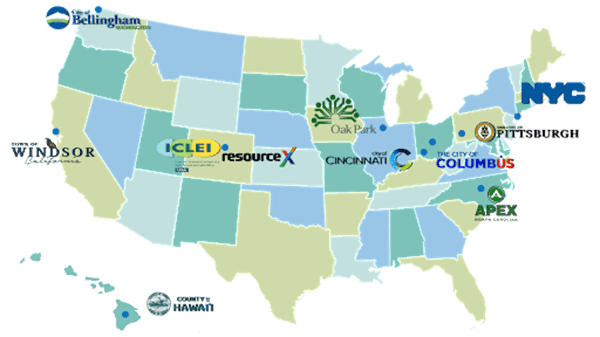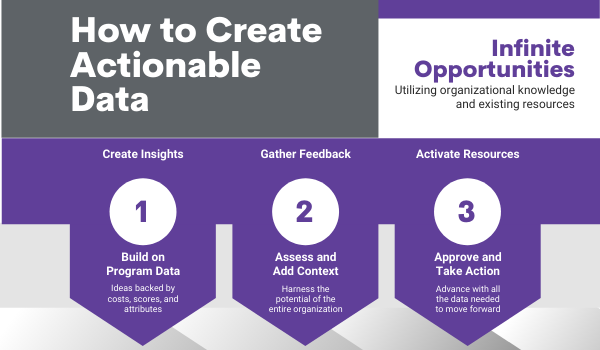“We know climate action requires climate investment, but sources of funding can be hard to find. An understanding of budget and procurement has proved critical to unlocking opportunities for climate funding. We spend millions of dollars on energy each year - how can we direct that toward renewable energy? Millions each year on fleet - how do we direct our spending toward zero emissions vehicles? In many cases these climate investments deliver real long-term operational cost-savings.” - Oliver Kroner, City of Cincinnati Director of the Office of Environment & Sustainability
American cities are facing an infrastructure project delivery crisis. This was one of the key assessments from the Ambition Gap, a policy brief drafted by ICLEI-USA in 2022. It's a complex statement, but in essence local governments for a variety of reasons are having a difficult time translating their stated objectives - especially regarding addressing the challenges of the changing climate, into actionable, buildable projects.
This is not to say nothing is happening within local government, quite the contrary, many cities and local governments are taking action by investing in renewable energy, transitioning their fleets to non polluting alternatives and creating more energy efficient facilities. However, the scale of action required to meet ambitious emissions reduction targets or support the construction of climate resilient infrastructure is not being attained at the moment. The technological and construction wherewithal and the financial resources available through the private sector and federal government are at a level of budget and procurement complexity that many local communities are unsure how to utilize.
Several of the key findings of the 2022 Ambition Gap policy briefing are more salient now and are even amplified as acute shocks like heat waves, wildfires and other extreme weather events collide with enduring stressors like aging infrastructure and systemic inequalities within communities, leaving city administrators wringing their hands. Consider these three findings from the research:
First, the Infrastructure Investment and Jobs Act (IIJA) and Inflation Reduction Act (IRA) offer unprecedented opportunities for local governments to take action on climate change and inequality, but successful deployment requires cooperation in city-halls between sustainability, procurement, budget and community development officers, alongside of private sector partners that can enhance financial, design and construction capabilities;
Second, local governments must begin thinking at larger scales of impact and leverage their existing capabilities in areas where they have direct influence such as municipal budgeting, land use planning, energy procurement and infrastructure design;
Third, the financial implications of climate change are becoming more and more in focus. From budget implications to bond ratings and insurance rates (and even insurance availability), the financial risks of climate change are placing strains on municipal budgets in ways formerly unaccounted for in traditional financial modeling.
Creating a Community of Practice
Recognizing the needs associated with accelerating climate action plan implementation and the local government ‘delivery crisis’, Resource X partnered with ICLEI-USA in 2023 to forge a Budgeting for Climate Action learning cohort of nine municipalities focused on advancing their climate action plans and leveraging the resources of their municipal budget to achieve their stated objectives. Each municipality recognized the impediments facing their climate plans and the need to better align their jurisdiction’s financial capabilities with the needs identified in their climate plans. This diverse cohort consisted of small towns, counties and the country’s largest city, New York City. Several lessons formed as a result of the initial work of this community of practice:
- Communication across departments is critical. In many cases, budget officers and sustainability or climate teams never had formal communications between their divisions. Creating a common, shared language and understanding of their roles and key milestones is a critical first step towards integrated climate action into the budget process.
- Creation of a “Climate Budget” process allows for opportunities to integrate citywide goals and targets into the fiscal responsibilities and capabilities of local government. Such integration can help local governments manage progress towards goals like greenhouse gas emissions reduction or installation of climate resilient infrastructure.
- Climate plan and budgeting integration creates opportunities to measure “true costs” within both the capital and operating budgets of local governments. These true costs are especially true when lifecycle cost assessments and risk management factors are integrated into both the human and physical infrastructure associated with local government operations.

The cohort, the first of its kind among American cities, created a strong foundation for building the practice of climate aligned budgeting. While the lessons are simple, they are not obvious for many local jurisdictions. Making climate action a budget priority requires leadership, the ability to harness data and transparency that can lead to innovative insights that yield improved government operations and better stewardship of fiscal and human capital.
Continued advancement of climate budgeting will require additional resources and wider adoption if local governments are able to meet their ambitions to significantly reduce emissions and construct more resilient infrastructure. Local governments that make climate investments a priority in their budgets can yield opportunities to spur economic development, while also mitigating their communities from the omnipresent financial risk exposure caused by the changing climate.
Why Every Local Government Needs a Climate Budget
Although the need for a climate action plan is obvious, the way to pay for it often isn’t. Traditional line-item budgets obscure insights into how funds are used at the program level. This lack of visibility makes it difficult to allocate sufficient budget to programs that serve climate action goals.
A climate budget is “a systematic approach or governance system that ensures the carbon budget, or long-term emissions reduction target, is integrated into a city’s daily operations and policies.” Offering a strategy to turn climate commitments into funded and measurable actions across the government.
In other words, it creates and institutionalizes a decision making framework to help local governments make the climate a decision driver across departments, prioritize the climate in operating and capital spending plans, and turn climate action plan goals into financed action items.
How Climate Budgeting Impacts Climate Action Plans
A climate action plan (CAP) is a science-backed strategy that defines how a local government will reduce greenhouse gas emissions.
CAPs are used to identify the most cost-effective approach to reducing emissions in a region. However, the plan may also include clean energy targets, resilience strategies, social goals, and economic goals. A CAP is essentially the framework that supports the plan’s action items, including directives that address climate changes that are already occurring in specific regions.
ICLEI USA has identified six phases of climate action execution in local government:
- Discovery: the development of the GHG inventory and identification of climate risks, opportunities and threats.
- Planning: the creation of the climate action plan that guides activities of either mitigation, adaptation or both.
- Scoping: the design of specific activities originating from the climate plan.
- Budgeting: integration of climate action and resource allocation to support the climate plan through revenue streams, or new financial structures.
- Procurement: purchasing or selecting specific tools, infrastructures or human resources to support the delivery of the climate plan
- Delivery: execution of a project task, process or asset allocation identified in the climate plan.
In order to transition from climate planning to climate action, funding must be allocated to the CAP through the operating and/or capital budget. Climate budgeting supports climate action planning efforts by:
- Embedding climate targets, measurements, and action items into the annual budget.
- Measure project, program and service alignment with sustainability goals.
- Prioritize and fund programs that support climate action.
- Providing insight into options to free up or reallocate existing resources and generate new revenue to drive investment towards climate action programs
- Develop a budget proposal scoring matrix to consistently and transparently evaluate proposals across multiple competing priorities.
- Apply a climate focused decision-making framework to ongoing budget decisions.
Climate Cohort Outcomes and Case Studies
Leveraging existing resources through municipal and county budgets provides a critical starting point and an immediate opportunity to make critical climate investments and mitigate the accumulating costs associated with weather-born events. By aligning resources, staffing, and priorities across departments, local governments can optimize opportunities and action towards community decarbonization and resilience.
Altogether, a whole-of-government approach to budgeting paired with advanced, delivery-oriented project management is the recipe for fully seizing this climate opportunity. This approach is the purpose of the Budgeting for Climate Cohort. The goal for cohort participants was to each identify 1 – 3 unfunded climate actions and develop strategies to fully fund, implement and execute these actions. Learn what Budgeting for Climate Cohort participants are accomplishing below:
City of Pittsburgh - Budgeting for Fleet Electrification
The City of Pittsburgh’s journey of vehicle electrification is a leading example of cross department collaboration, policy development and budget integration. Recognizing the need to obtain the support of multiple departments to introduce electric vehicles into the City’s fleet, the Division of Sustainability and Resilience partnered with the Office of Management and Budget (the agency tasked with overseeing fleet operations) to initiate a fleet baseline analysis that captured the utilization, carbon emissions and budgetary impacts of fleet operations. The fleet baseline enabled the Sustainability and Budget teams the ability to look at the economic, operational and environmental impacts concurrently. The analysis enabled the creation of the City’s Low Emission Vehicle Policy and the design of several procurement and charging infrastructure deployments that have led to annual budgetary investments in electric vehicles and power infrastructure which are lowering emissions and fleet operating costs.
The City of Cincinnati - Municipal Led Solar Power Purchase Agreement
Making renewable energy pledges or creating targets are bold endeavors for cities. Executing on those pledges is another level of achievement. Cincinnati is home of the largest municipally established solar array in the country. The City’s 20 year power purchase agreement for a 100 MW facility in Highland County, Ohio - which is about 45 miles east of Cincinnati, provides a predictable, fixed price form of renewable power. The minimization of cost escalation in the contract allows for reliable budget prognostication and savings at the end of the contract that approaches $2.0 million. The installation of over 300,000 solar panels at the farm creates a number of co-benefits including: clean, renewable electrical power for all of the City’s facilities, reduction of almost 160,000 MT of CO2 and creation of 160 union jobs with the local International Brotherhood of Electrical Workers (IBEW).
New York City - Sustainability and Budget Team Integration Towards Climate Budgeting
New York City is a complex and sprawling municipal operation with over 300,000 employees. Organizational structure and leadership are critical to creating systemic organizational change and determining resource allocation. Plan NYC has been a critical climate integration exercise over successive mayoral administrations. In 2022, NYC began a critical alignment designed to prioritize climate and environmental justice investments in the budget decision-making process when it co-located its sustainability and budget teams. The effort links together the functions of budgeting with an integrated approach of sustainability. In this new organizational configuration, sustainability team members are able to evaluate climate and resilience needs and functions alongside the traditional budgetary process. This new staffing alignment incorporates climate considerations into the city’s budget decision making process by evaluating how actions and spending today contribute to meeting longer-term climate targets. The process helps decision makers understand the climate impact of the dollars spent, identify where more investment is needed, and champion forward-looking investments to equitably achieve net-zero emissions citywide by 2050, as well as bolster resilience to weather born events.
Village of Oak Park, IL - Community Focused Decarbonization through Home Retrofits & Public EV Charger Network
Oak Park is a village in Cook County, Illinois, adjacent to Chicago. It is the 26th-most populous municipality in Illinois, with a population of approximately 55,000. On Aug. 1, 2022, the Village Board adopted Climate Ready Oak Park, a comprehensive and long-range plan developed in response to the global climate crisis. The plan offers an ambitious vision, concrete commitments and actions that can be undertaken by all community members and organizations.
- Climate Ready Oak Park Commitments
- Decrease community-wide greenhouse gas emissions by 60% by 2030.
- Achieve community-wide net zero greenhouse gas emissions by 2050.
- Meet the energy needs of Village facilities with 100% renewable electricity by 2030.
- Establish 30% of Oak Park’s land as green infrastructure or enhanced park management.
- Direct 40% of public climate and sustainability dollars to the most vulnerable.
- Partner with the most impacted to create climate and sustainability policies and programs.
Through the cohort, Oak Park has increased communication across Sustainability, Finance and Procurement departments and specifically enhanced collaboration between Finance and Sustainability. These actions have identified the highest priority projects for the Village, including decarbonization efforts through Home Retrofit Programs, Public EV Charger Network and Electrification of Village Fleet Vehicles.
Through initial Climate Budgeting efforts, the Village began developing a decision making framework to evaluate highest priority CAP projects in an environment of limited revenue and competing priorities. Ultimately creating a comprehensive scoring and evaluation matrix to elevate the highest priority decarbonization projects that will have the greatest impact towards advancing decarbonization efforts.
City of Bellingham, WA - Developing a Finance Stack for a Home Electrification Pilot Program
Bellingham is a coastal city in Washington State, near the Canadian border with an estimated population of 93,000. In 2005, City Council committed to the Cities for Climate Protection Campaign and its five milestones. That process resulted in Bellingham’s 2007 Climate Protection Action Plan, which included emissions reduction targets for 2012 and 2020. The City has completed the initial five Climate Protection milestones and has now renewed our commitment to greenhouse gas reduction in the Climate Protection Action Plan 2018 Update (51MB), charting a course to meet new targets in 2030 and 2050. Starting in 2018, the City’s Climate Action Plan will be updated every 5 years. The next update is scheduled for this year.
While the city has been actively taking steps to advance climate action by focusing on municipal operations, Bellingham’s CAP equally focuses on community decarbonisation and adaptation. Without clear and dedicated funding to support community focused climate action. Identifying and elevating a gap between budget and community climate action.
Through the cohort, sustainability and finance forged a closer bond to focus on activating CAP projects in the community. And prioritized a Home Electrification Pilot Program the city was working to advance. Through a complex funding structure including city funds, County and State grants and rebates, and Federal funding, the Home Electrification Pilot Program was initiated.
County of Hawaii, HI - Implementation of County Integrated Climate Action Plan (ICAP)
Hawaii County is a county in the U.S. state of Hawaii in the Hawaiian Islands. It is coextensive with the Island of Hawaii, often called the "Big Island" to distinguish it from the state as a whole. The estimated population is approximately 200,000.
On June 30, 2023, the County published the final Integrated Climate Action Plan. The ICAP is a cross-departmental effort that charts the County's responsibility to reduce its contribution to global climate change and make its services and facilities resilient to the effects of a changing climate. The ICAP identifies actions the County can take and will be used as a tool to hold the County accountable for climate action.
Town of Apex, NC - Advancing and Expanding Fleet Conversion & EV Charger Network
Apex is a town in Wake County, North Carolina, with a population of approximately 63,000. The Peak Sustainability Team (PST) began work on July 13, 2020 with a focus on establishing sustainability initiatives set by the Town Council, Town staff, and community. The Apex Sustainability Action Plan priorities include:
- Clean Fleet & Electric Vehicle Adoption Strategy
- Energy Efficiency Assessments for Town Facilities
- Smart Waste Reduction & Management
As of July 2022, the Sustainability Program office has been embedded within the Town’s Budget, Performance, and Strategy Department.
As part of the cohort, Apex prioritized revamping and rebuilding the Town’s existing EV charger network, expanding upon the existing municipal EV fleet, and obtaining better data on the network’s and fleet's true impact on city operations.
Town of Windsor, CA - Funding and Activating the Windsor Climate Resilience Plan
Windsor is an incorporated town in Sonoma County, California, United States. The town is 9 miles north of Santa Rosa and 63 miles north of San Francisco. The population is estimated to be approximately 26,000, making Windsor the smallest organization participating in the Climate Budgeting cohort.
On February 16, 2022, the Windsor Town Council unanimously accepted the Windsor Climate Resilience Plan. The Windsor Climate Resilience Plan addresses several of the Town’s needs including: completing Transportation Infrastructure and Social Vulnerability Assessments; supporting and facilitating community discussions about our vision for a better and more resilient future; collaboratively developing strategies and approaches to reduce the risk of wildfire, drought, extreme precipitation and flooding.
Windsor’s budget development cycle ran concurrently with the cohort timeline. Providing an ideal opportunity for the Town to incorporate climate action, resiliency and strategic plan goals into budget development and adoption. Resulting in the incorporation of sustainability goals and actions into budget deliberations and approval of sustainability driven budget proposals (including the approved purchase of EV’s to add to the municipal fleet.)
A Community of Practice
Municipalities are facing a growing demand to integrate their climate action planning and budgeting processes. The purpose of the Resource X and ICLEI-USA “Climate Budget Cohort” is to create a community of practice among municipal budget and climate planning professionals. Together, as demonstrated by its inaugural municipal cohort, a community of practice can help to accelerate the implementation of climate action plans through improved budget design and integration of the costs and infrastructure investment considerations that are associated with mitigation and adaptation activities.
As a growing number of municipalities recognize the disconnects between the status quo budget as usual process and the need for municipal climate investment strategies, more resources and attention is needed to bring government finances inline with the new fiscal realities associated with climate change’s implications on local governments.
Recent years have demonstrated that the fiscal and physical impacts of climate change are accelerating. Local governments need to take three immediate steps:
- Improve communications between budgeting and climate professionals on staff,
- Identify linkages and gaps between existing and future programs with a climate lens, and
- Establish budgetary priorities that better leverage scarce municipal resources
Taking these steps to be better prepared to reduce carbon emissions and build resilience against climate risks will aid municipal budget sustainability and support the residents that they serve, especially the most vulnerable populations.
Contact:
Angie Fyfe, Executive Director, ICLEI USA, angie.fyfe@iclei.org , 510-844-0699
Erik Fabian, Strategic Partnerships Manager, ResourceX, efabian@resourcex.net
About the Collaborators
ResourceX supports local governments to strategically align resources with community outcomes. Erik Fabian serves as the Strategic Partnerships Manager. Through Priority Based Budgeting (PBB) methodology and software, local governments are accelerating data-driven decision making and budgeting to align resources towards society’s biggest challenges. Providing a platform to fund equity initiatives, climate action plans, and a fiscally sustainable future for residents and the community.
ICLEI is a global network of more than 2,500 local and regional governments committed to sustainable urban development. Active in 125+ countries, ICLEI influences sustainability policy and drives local action for low emission, nature-based, equitable, resilient and circular development.
ICLEI USA is an acknowledged leader in local government technical assistance, providing the tools, standards, and programs for local governments to measurably reduce carbon emissions.
Grant Ervin serves as the Director of ESG and Innovation for S&B USA. Mr. Ervin is a Climate Advisor to ResourceX, served as a Sr. Advisor to ICLEI USA from 2022-2023, and Chief Resilience Officer for the City of Pittsburgh from 2014-2022.






